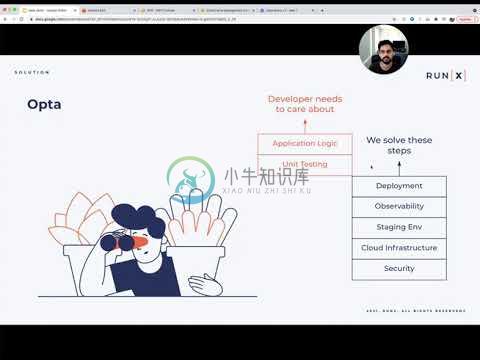
Supercharge DevOps on any cloud
Documentation | Slack Community | Website | Email: info@runx.dev
What is Opta?
Opta is a new kind of Infrastructure-As-Code framework where you work with high-level constructsinstead of getting lost in low level cloud configuration. Imagine just being able to say that you wantan autoscaling docker container that talks to a RDS database - instead of figuring out the details of VPC,IAM, Kubernetes, Elastic Load Balancing etc -- that's what Opta does!
Who is it for?
Opta is designed for folks who are not Infrastructure or Devops experts but still want to build amazing,scalable, secure Infra in the cloud. Majority of Opta's users are early stage startups who use it for theirdev/staging/production environments.
If you'd like to try it out or have any questions - feel free to join our Slack!
Try out Opta
To use Opta, you first need to create some simple yaml configuration files that describe your needs. You can useour magical UI to help generate these files or do it manually (described below).
Four Step Quick Start (<30min)
- Install the opta CLI
/bin/bash -c "$(curl -fsSL https://docs.opta.dev/install.sh)"
- Create an environment
Before you can deploy your app, you need to first create an environment (like staging, prod etc.)This will set up the base infrastructure (like network and cluster) that will be the foundation for your app.
Note that it costs around 5$ per day to run this on AWS. So make sure to destroy it after you're done(opta has a destroy command so it should be easy :))!
Create this file and name it staging.yml
name: staging
org_name: <something unique>
providers:
aws:
region: us-east-1
account_id: XXXX
modules:
- type: base
- type: k8s-cluster
- type: k8s-base
- Create the application/service
In this example we are using the popular httbin container as our application
Create this file and name it opta.yml:
name: hello-world
environments:
- name: staging
path: "staging.yml" # Note that this is the file we created in step 2
modules:
- name: app
type: k8s-service
port:
http: 80
image: docker.io/kennethreitz/httpbin:latest
healthcheck_path: "/get"
- Deploy
Once the files are created, just run opta apply and that's all! Now you have a containerized applicationrunning on Kubernetes in a production ready Architecture (described below).
Run opta output and note down load_balancer_raw_dns. Now you can:
- Access your service at
http://<ip-or-dns>/ - SSH into the container by running
opta shell - See logs by running
opta logs
Cleanup
Once you’re finished playing around with this example, you may clean up by running opta destroy --config staging.yml.
Check out more examples
What you get with Opta
- Production ready Architecture
- Continuous Deployment for containerized workloads
- Hardened network and security configurations
- Support for multiple environments (like Dev/QA/Staging/Prod)
- Integrations with observability tools (like Datadog/LogDNA/Prometheus/SumoLogic)
- Support for non-kubernetes resources like RDS, Cloud SQL, DocumentDB etc
- Built-in auto-scaling and high availability (HA)
- Support for spot instances
Development
-
// ############################################################################ // Hard constraints // ############################################################################ // Lectures: A missi
-
opta planner There are sites that offer Christmas Planner templates, usually in pdf format, which you can download and print. Then, store the printed sheets in a binder, and write out your task list,
-
7模式下的URL:jdbc:inetdae7:<host:>1433?database=<> 1. 中文表名、中文字段名该驱动支持 2. 支持所有基本类型的增,删,查,改(除timestamp不能增改外) 3. Char、varchar、text读取应用 getBytes()再转成字符串,而写入setString或setBytes; Text可以用setCharacterStream()
-
我正在使用optaplanner 8.3。0和optaplanner spring启动程序,我使用的是约束。drl文件。在以前的版本中,drl错误相当明显,并且有行号等。 在此配置中,我将收到如下日志消息: 类型化表达式输入:drlxexpr=卷,模式类型=类com.drift.excelsgl.domain.planning.预期坦克级别,声明=[] ... 2021-03-17 09:01:1
-
optaplanner-spum-boot-starter自动发现ContraintProvider,没有解决onfig.xml,所以如果我们想为不同的问题使用多个constrantProvider,比如问题A,需要使用问题A ContraintProvider和问题B,需要使用ProblemBContraintProvider,有任何限定符种类我可以使用的注释,并告诉solverManger使用
-
我正在享受Optaplanner的旅程。Java不是我的“母语”,但令我惊讶的是(陡峭?)Optaplanner学习曲线 到目前为止,我得到了什么:我已经制作了一个带有必要类的项目。为了回答我的问题,我将简化为:一个类、一个类、一个类和类,我想在其中获得我完美的Opta计划时间表。 我的员工类有一个变量
-
要在IntelliJ中运行OptaPlanner示例,我遵循“\OptaPlanner-distribution-7.23.0.Final”中“ReadMeOptaPlanner”中的指南: 在IntelliJ中打开pom.xml作为项目 编辑运行配置。 然而,我不得不手动更改源和目标版本以避免错误: 文件- 但现在我在构建代码时遇到100个错误,例如: 错误:(24,62)java:包org.o
-
正如我在前一个问题中提到的,我正在使用优秀的OptaPlanner库创建一个应用程序,该应用程序可以帮助定制job shop进行项目调度。该应用程序具有以下要求: “除非经理特别批准,否则申请不得在任何给定的周末或假日安排工作。” 我很好奇如何更改我的域模型或评分函数以纳入此要求。一个基本想法是将全球可再生资源(即员工)的容量从每月30天减少到每月22天(包括周末)。然而,我已经看到,这是一种幼稚
-
您是否认为OptaPlanner是规划具有多层次工艺路线(最终产品、子装配1、子装配2、子装配11、子装配12等)的制造操作的正确工具? 我们讨论的是1000个生产订单,每个订单有10-20个操作。 我知道,看起来像项目车间调度。我只是关心数据量和在合理时间内找到最佳解决方案的能力... 对于这个问题域和OptaPlanner,有真实的例子吗?
-
有人能解释一下如何在OptaPlanner中为项目作业调度问题建模我自己的数据吗?我看到有xml文件、txt文件和很多。mm文件(j1010_1.mm),我不知道如何对自己的输入建模。 样本A_1中的这些数字是什么。txt是什么意思? 2 0 10 j10。毫米/j1011_7。毫米4 19 j10。毫米/j1060_2。毫米4 16-1-1-1 我想是 2-项目数量0-发布日期10-关键路径持续


